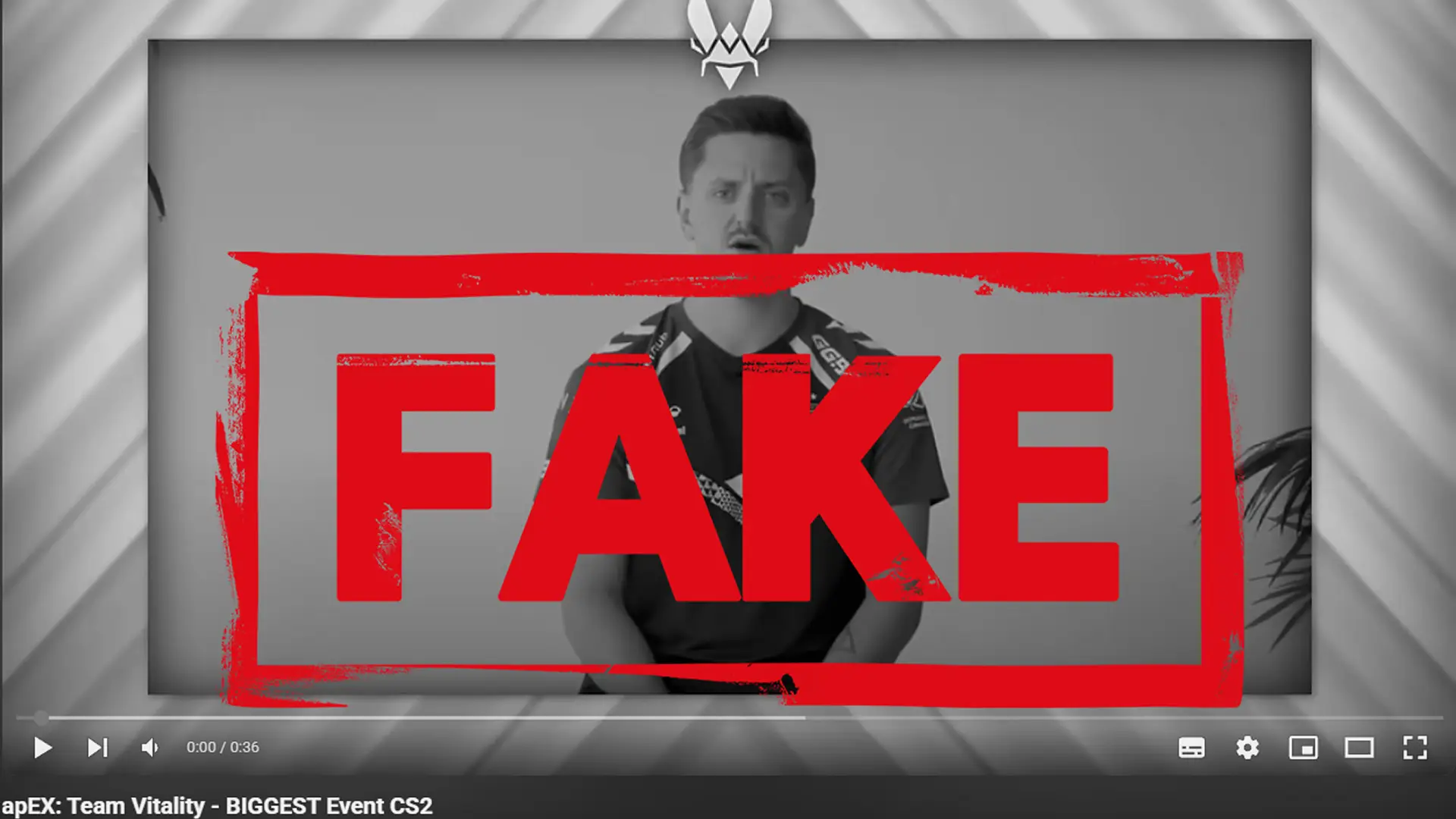Team Vitality’s CS2 captain, Dan “apEX” Madesclaire, published a crucial warning on X (Twitter), alerting the community about a fake giveaway on YouTube using his name and the Team Vitality brand. According to apEX, he has no connection to the promotion, calling it outright fraud. The incident raises serious questions about cybersecurity, platform responsibility, and trust in the esports community.
What happened: fake giveaways in apEX’s name
In his post, apEX was direct and clear:
SCAM ALERT
There is a fake giveaway on YouTube using my name and the Team Vitality brand. This is not me. It’s a scam.
— @Vitality_apEX
The player pointed to a fake YouTube channel pretending to host a giveaway on his behalf. These scams typically offer skins, prize money, or valuable items — classic bait to lure in victims.

Who’s vulnerable, and why it matters
Fans — especially younger audiences — are often quick to believe in such giveaways without verifying the source. Trusted names like apEX add credibility to scams, especially when fraudsters use official logos, match footage, or real quotes. In such cases, it’s hard to spot deception without careful scrutiny.
These scams often involve:
- Asking for Steam login/passwords or account credentials
- Requesting a “processing fee” to claim the prize
- Redirecting users to phishing links that steal personal info
Esports: a new target for online scammers
Esports today is more than just gaming. It’s global broadcasts, massive prize pools, and household names. And apEX is one of those brands that carries trust. That’s why prominent figures are often exploited as bait.
Fake giveaways are nothing new to the CS2 community. Similar scams have surfaced involving s1mple, ZywOo, NiKo, and even entire organizations like NAVI or FaZe Clan. Each new case further erodes trust in legitimate community-driven initiatives.

Platform responsibility: is YouTube doing enough?
The incident also casts doubt on YouTube’s moderation effectiveness. Despite its massive resources, the platform often fails to respond quickly unless major media brands are involved. Influencers and esports players are frequently left to warn their own followers via X or Discord.
Scam channels can remain active for days or even weeks, gathering tens of thousands of views and potentially hundreds of victims in the process.
Community reaction: confusion, irony, and unknowing victims
Following apEX’s post, the community quickly reacted. Players, fans, and esports insiders began spreading the message to raise awareness. But perhaps more telling were the replies — real user comments that either unwittingly exposed themselves as victims or unknowingly echoed the scam script.
Some examples from the tweet’s replies:
- Vinicius “V$M” Moreira: “I won the giveaway you did in YouTube now, where is my $10,000 ????? I did the form and created account in your link. When I receive the skins?”
- @CutzMeretz and @Cs2fla: Posted identical comments — a possible sign of bot activity or copy-paste instructions from scammers.
- @O_7x_: “AI??” — a sarcastic jab, perhaps mocking the automated nature of the scam.
- @CirmanGG: “In case anyone wants to hear how funny AI-pex sounds” — an ironic take on the situation, playing on apEX’s name.
These reactions highlight multiple layers of the issue: from genuine victims to sarcasm, and even fans inadvertently participating in spreading the fraud.

How to stay safe: essential tips for players
- Verify the source. Real giveaways are announced through official, verified player or team accounts.
- Avoid suspicious links. Especially livestreams claiming “click here to win” — this is a huge red flag.
- Never share Steam credentials, bank info, or passwords. No legitimate giveaway will ever ask for them.
- Report fake content. If you encounter suspicious videos or posts, report them immediately to the platform.
apEX’s warning isn’t just about protecting his name. It’s a gesture of responsibility toward a community that trusts him. The incident is a reminder that even top esports figures can be used as bait for cybercrime. Vigilance, digital literacy, and support within the community remain the most effective weapons against online scams in today’s esports world.








































